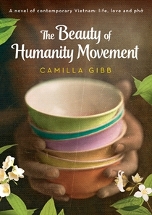The Beauty of Humanity Movement by Camilla Gibb

Atlantic, 2011. ISBN 9780857891716.
Old man Hung, a Vietnamese pho maker is the centre of this complex tale
from which inter-generational stories of artistic martyrdom, romance,
survival and family drama radiate. Pho, (what Westerners would consider
a beef broth), is to Hung's loyal customers a work of art having deep
cultural significance. As a boy, Hung was sent from a country village
to Hanoi in the 1930s to work with his uncle and the nation's torment
at the hands of foreign powers is conveyed to the reader through his
ruminations.
French Colonialism, Japanese invasion, post-war portioning, hostilities
between the North and South, intervention by China, Russia and America
all contribute elements to this evolutionary tale which might have been
irretrievably bleak. Somehow, the irrepressible spirit of Hung, who
symbolises the tenacity and stoicism of his people carries the reader
through a mire of appalling suffering, Buddhist teaching, familial
devotion, courage and political philosophy are the armour which
protects the characters against oppression, cruelty and corruption.
Depiction of mindlessly destructive agrarian reforms which caused
wholesale starvation and political machinations which were little more
than bloodthirsty purges are unfortunately historically accurate and
mirror the Chinese and Russian experience of extreme Socialism. This is
not a wholly bleak story however. The optimism shown by the characters
in the more benign political climate of Doi Moi (where trade and
private ownership is allowed) is captivating and provides hope.
The presence of an American born Vietnamese woman who deals in art and
who hopes to understand the fate of her politically defiant father
brings about interaction with locals who are endearing for their
respect, decency and wonderful humour.
The book is more than a lesson in political history. This is a deeply
spiritual story, yet the reader also comes to understand the
characters' celebration of simple pleasures. This is particularly
evident in the constant references to food, made more noticeable by the
suffering caused by starvation in earlier times.
Rob Welsh